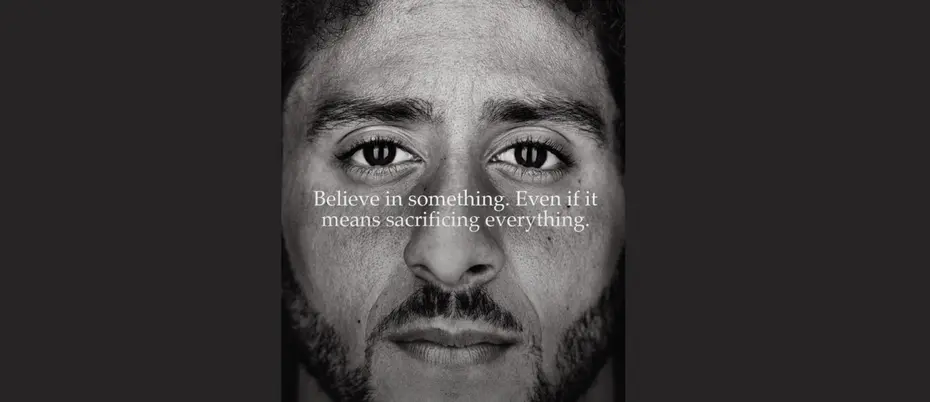Marketing
In Kaepernick ads, Nike further develops its brand point of view
Branding isn’t a popularity contest. It’s about having personality, authenticity, and standing for something or someone. In Nike’s case, it’s people like Colin Kaepernick.
It’s a simple image — a black and white photograph of Colin Kaepernick, mouth set, eyes staring straight into the camera — but for those who know what to look for, the 30th anniversary ad for Nike’s “Just Do It” tagline speaks volumes.
“It’s hall-of-fame-level type advertising,” said MIT Sloan senior lecturer and research scientist Renée Gosline, who has conducted research on brand strength and social media storytelling. “Not to mention the signal it sends given the current climate.”
Kaepernick has been a lightning rod for free speech and civil rights since 2016, when he first began kneeling on the sidelines during the national anthem before NFL games, as a protest against police brutality. He drew the ire of politicians and football fans, many of whom accuse him of disrespecting American veterans, servicemen, and servicewomen. Now a free agent, the former quarterback for the San Francisco 49ers went unsigned in the 2017 season.
But last week a judge denied the NFL’s request to throw out his case against team owners he accuses of conspiring to blacklist him. The 2018 season begins Sept. 6, just days after the ad’s release. Earlier this year Nike signed an 8-year contract with the league to provide game-day uniforms.
“The timing is obviously a well-intentioned decision, and it also reflects a need for marketing campaigns in today’s network culture, to get people talking,” said Ben Shields, an MIT Sloan senior lecturer who was previously director of social media and marketing at ESPN. “That’s precisely what this campaign is designed to do.”
For Nike, use of a brand point of view
According to Apex Marketing Group, in its first day the ad generated more than $43 million in media exposure. The company’s shares closed 3.2 percent down, according to reports, the biggest drop since April, but so did the shares of rival company Adidas.
“People think branding or marketing is to sell the most amount of products to the greatest number of people. Perhaps if you’re thinking widgets,” Gosline said. “But in actuality in order for a brand to be really enduring, it has to have a point of view, it has to have a personality, it has to have authenticity. By definition then, it needs to take a stand, and some stands are less controversial than others. But it needs to stand for something.”
Nike built its empire on the tagline of “Just Do It,” approaches the notion of athletics not as about scoring the highest number of points, Gosline said, but how you play the game.
“Leadership, authenticity, ‘Just Do It,’” Gosline said. “Those things are packed up in the Nike brand. It’s not ‘we absorb x-percent shock more than other shoes.’ They’re not talking about that. What Nike is talking about is fundamental core values of who you are, they want to sort of be a beacon for that, they want you to recognize the type of person you are or would like to be. And the Nike brand stands for that.”
A celebrity ‘cause-fit’
What’s important to note about Nike’s partnership with Kaepernick, or any other company working with a celebrity, is the celebrity cause-fit within marketing, said Sharmila Chatterjee, a senior lecturer in marketing at MIT Sloan.
Nike isn’t promoting the idea of protesting “The Star-Spangled Banner,” but it is promoting Kaepernick’s decision “to be who you want to be,” Chatterjee said.
"Nike wants to support ‘be who you want to be, just do it,’ if that is the interpretation it is taking, then Kaepernick connotes that,” Chatterjee said. “If Nike wants to support that cause, i.e., ‘stand by your convictions’ cause, there’s a brand fit and authenticity here. By doing this there’s a way to increase the brand credibility of Nike. There’s a match here, it just so happens that in this case the actions of the celebrity or the spokesperson, is emotionally charged.”
Even if Nike isn’t directly supporting Kaepernick’s cause, the company is going to find itself on one side of civil rights history.
Gosline compared Kaepernick’s story to civil rights icons like Martin Luther King Jr., Muhammad Ali, and Aretha Franklin. Particularly Ali, a decorated boxer, who endured a tremendous amount of criticism for his stance on war and civil rights. But later in life and after his death, he was “lionized” for his courage.
“History has a tendency to sanitize activists, and only talk about how impactful they were, but people forget that at the moment, they were raked across the coals,” Gosline said. “I think you might find this is what is going to happen with Colin Kaepernick in this particular case.”
Taking backlash and criticism — in Kaepernick’s case from as high up as President Donald Trump — is what Nike represents, Gosline said. It’s not about backing down or being weak or being intimidated.
When the odds are against you, the clock is ticking, you’re several points down and you’re the underdog, Gosline said, “having the confidence and being the winner regardless of what the final score is, that’s what ‘Just Do It’ is about.”
In fact, Nike may bring some new life to its brand, Gosline said. With the Kaepernick ads, Nike has moved from a “wallpaper brand” that anyone and everyone wears, to a brand that has a point of view and is taking a stand.
“It’s kind of reinvigorating Nike as a brand, and reinvesting an idea of kind of scrappiness and being strong regardless of what seems to be an insurmountable obstacle,” Gosline said. “And that is bigger than what you wear on your feet when you go for a run or walk around the mall.”
And what about the NFL?
As expected, Nike received a lot of attention on social media, both good and bad, for its first ad with Kaepernick. On Sept. 5 it released a commercial narrated by Kaepernick (who also makes a cameo) called “Dream Crazy.” Within 24 hours the video had more than 5 million views on YouTube.
But it’s more about what is going to happen in the long term, the experts said.
Shields said Nike’s decision to work with Kaepernick points to larger issues for the NFL.
“One of their core partners is willing to break rank to build their own brand, potentially at the expense of the current challenges that the NFL faces,” Shields said. “Nike’s making the bet that their target audience will react favorably to that alignment with the players.”
And if Nike loses that bet? It could be the result of perceived dishonesty, not Kaepernick’s image and platform.
In a 2005 study, Chatterjee and her fellow researchers found that trust is key to brand success.
“It is not enough to simply differentiate a brand. Managers of consumer goods companies should invest resources in building consumer trust in their brands,” the study stated. “The notion of brand trust is different from the notion of trust in a celebrity and, accordingly, the effects of brand trust could still be related to positive advertising outcomes.”
"Given Kaepernick fulfills the criteria for an appropriate spokesperson based on traditionally discussed branding criteria, I believe that Nike should come out fine in the long term," Chatterjee said.




